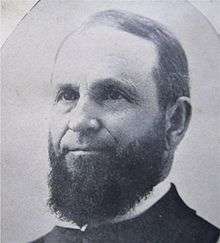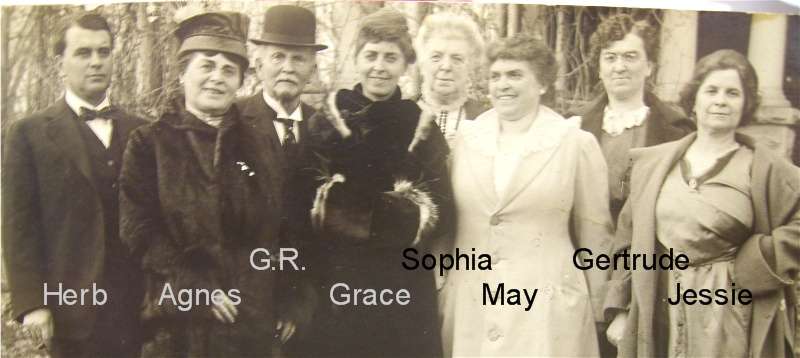George R. Struble

George Rix Struble (1836–1918).[1] Iowa judge and politician of Toledo, Iowa. Speaker of the Iowa House of Representatives, 1881-1883.[2] An ardent prohibitionist.[3] A prominent attorney in Iowa, once described as “the pride of the Bar in this community and the admiration of the Court.”[4] One of 12 siblings including: John T. Struble of Iowa City, and Congressman Isaac S. Struble of Plymouth County, Iowa. Granduncle of Bob Struble, Sr. and great-granduncle of Bob Struble, Jr.
The following biography appears in the Journal of the House, a memorial resolution of the Iowa state legislature, adopted 3/23/1921:[5]
George R. Struble.
Mr. Speaker – Your committee appointed to prepare resolutions commemorating the life and work of George R. Struble, late of Tama county, Iowa, beg leave to report the following memorial: Judge Struble departed this life at his home in Toledo, Iowa, December 15, 1918. He was born July 25, 1836, in Sussex County, New Jersey. His parents, Isaac and Emma (Cox) Struble, removed to Fredericksburg, Virginia, when he was quite young. They afterwards removed to Chesterville, Ohio, in 1847. In 1856, Mr. Struble came to Iowa, locating first at Iowa City and remaining there until the following spring. He then located in Toledo, Iowa, where on April 19, 1860, he was married to Miss Sophia J. Nelson.
He also was later in partnership with C.B. Bradshaw, M.M. Goodrich and L.G. Kinne, and in 1881, the firm of Struble & Stiger was formed, which continued as long as he remained in active practice.
From 1870-1872, he served acceptably on the circuit bench and in 1879 was elected to the General Assembly where he served two terms, the last term as speaker of the House of Representatives. He was affiliated with the First Congregational church of Toledo for many years and was zealous in his church life and in the support of all those things which are for the uplift of the community.
The life and work of Judge Struble remain as an inspiration to those who knew him. He gained his position and influence in life by arduous, painstaking labor and appreciated to the utmost the opportunities that life had afforded him. His energy, his intellectual powers, his untiring efforts for those he served, all characterize him as a man and citizen of whom it may well be said, “Well done, thou good and faithful servant.” Judge Struble was a director of the Toledo Savings Bank; in politics, a republican. Socially, he was pleasant, affable and courteous; however, always considering business paramount to social ties.
As a lawyer, he was quick to see a point and possessed a ready flow of language to push it; a forcible speaker well educated in his profession and withal, a most successful lawyer. He was a man in whom not only his county but his state took pride. Six children survive him as follows: Agnes N., Mary T., Gertrude N., Jessie F., Geo. Herbert, who was a member of the law firm at the time of his father’s death, and Grace T. The funeral was held in Toledo and burial in Woodlawn cemetery.
Whereas, The Honorable George R. Struble, has been called from this life, therefore,
Be It Resolved, That the House of Representatives has heard with deep sorrow and regret of his death and that it recognizes the high character of his service to his state and in his death the state has lost a worthy and noble citizen, and
Be It Resolved, Further, that these resolutions be spread upon the journal, that engrossed copies of the same be sent to members of his family.
F. W. Ingersoll, J.M. Ramsey, F.C. Sampson, Committee,
Adopted March 23, 1921.

Judge G.R. Struble, wife Sophia, and their six children. Photo likely taken in April, 1910, on the occasion of the celebration in Toledo IA of the couple's 50th wedding anniversary.
References
- ↑ A biography of some 160 words about G.R. Struble is in, Benjamin F. Gue, History of Iowa From the Earliest Times To the Beginning of the Twentieth Century, 4 vols. (New York: Century History Co., 1903) 4:254. The entry states that Struble attended the common schools of Chesterville, Ohio from an early age; also the local academy. Gue's history indicates that the Struble family settled in Iowa City in 1856, where young George studied law and was soon admitted to the bar. In 1857 he moved some 50 miles west to Toledo in Tama County, where he opened his practice as an attorney. Gue ends his account of Struble's political career in 1890. In that year the GOP nomination for Congress from the 5th congressional district went to Struble, but in the general election the nationwide landslide for the Democrats was too much to overcome. For the first time in almost four decades, the Democrats took a majority of the seats in the Iowa delegation to the U.S. House of Representatives.
- ↑ The History of Tama County, Iowa (Union Publishing Co., 1883) p. 313 states that GRS made "an excellent judge, logical, clear, prompt, and impartial...." At p. 462 it states that as speaker of the house, GRS "made one of the best presiding officers the General Assembly ever had."
- ↑ The Annals of Iowa, pp. 526-28. A raucous GOP state convention in late August, 1893, featured a floor fight over prohibition which was then being contested state by state. The proposed 13th plank in the Republican platform favored accommodation of those localities in Iowa which were inclined to opt out of the state law prohibiting alcohol. Opponents considered such a policy to be a retreat in the battle between the home and the saloon. Judge Struble, a hardliner, moved to remove the local option from the plank. Debate over the Struble amendment lasted three hours. Struble’s motion got 590 votes as against 613 for the more liberal position. The prohibition fight raged nationally for another quarter century until 1919 when (a month after Judge Struble's death) the states ratified the 18th Amendment. For the subsequent 14 years the U.S. Constitution prohibited throughout the United States “the manufacture, sale, or transportation of intoxicating liquors.”
- ↑ See "Funeral Discourse" cited below; also J.R. Caldwell, ed., A History of Tama County Iowa, 2 vols. (New York: Lewis Publ. Co., 1910), vol. 2, p. 650-53. After chronicling GRS's political career, Caldwell's history states: “But it is the courts of Iowa which know him best, as for many years there was scarcely an important lawsuit of any character in Tama County in which he did not appear…. He appeared for the plaintiff in suit for large damages brought by Michael Casey against Tama County; successfully defended Shelton in a trial on a charge of murder which came here on a change of venue from Marshall County, and … also defended John and Bill Buhmann upon a charge of murdering John Brown at Gladbrook. He is a skillful pleader, deeply versed in the intricacies of the law, and has great influence with both juries and judges.”
- ↑ State of Iowa,Journal of the House, 1921, pp. 2265-66.